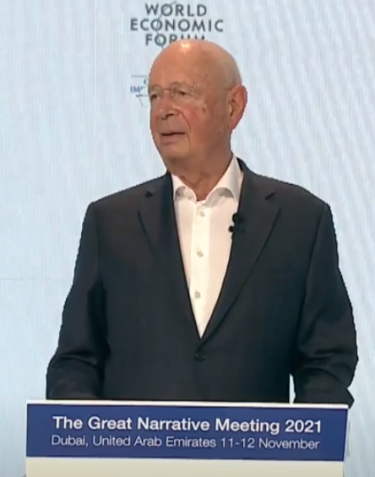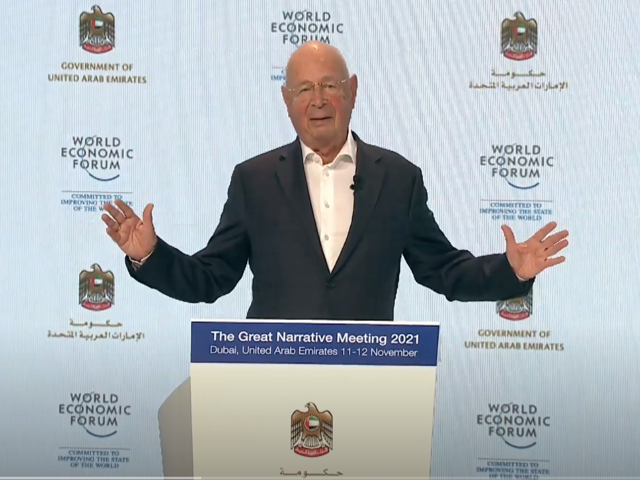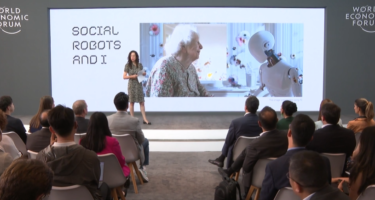World Economic Forum (WEF) Founder Klaus Schwab launches the Great Narrative Meeting in Dubai, which aims to create a “story for the future” that will be the “great narrative for humankind.”
The WEF’s great reset is about to have a great narrative to further its agenda.

Klaus Schwab
“We are here to develop the great narrative, a story for the future” — Klaus Schwab, Great Narrative Meeting, 2021
Speaking at the Great Narrative Meeting in Dubai, United Arab Emirates today, Schwab announced his intent to develop a great narrative that public and private entities will use to shape the future of humanity.
“We are here to develop the great narrative, a story for the future,” said Schwab.
“In order to shape the future, you have first to imagine the future, you have to design the future, and then you have to execute it,” he added.
“Here, I think the next two days, we will look [to] how we imagine, how we design, how we execute the great narrative, how we define the story of our world for the future.”
“Let’s use our positive energy really to create a great narrative for humankind in the next two days” — Klaus Schwab, Great Narrative Meeting, 2021
“People have become much more self-centered, and to a certain extent, egoistic” — Klaus Schwab, Great Narrative Meeting, 2021
The Great Narrative Meeting runs for two days where the unelected globalists will brainstorm ideas on how to run society from the top-down, and they will publish their findings in a book called “The Great Narrative” in early 2022.
According to Schwab, there are three obstacles in the globalists’ way of shaping humanity’s future :
- People have become much more self-centered, and to a certain extent, egoistic. In such a situation it is much more difficult to create a compromise because shaping the future, designing the future usually needs a common will of the people.
- We all have become so much crisis-focused with the pandemic.
- The world has become so complex. Simple solutions to complex problems do not suffice anymore.
On the complexity of the world, Schwab added, “You have today, not anymore separation between social, political, technological, ecological — it’s all interwoven.
“It’s very difficult in such a situation to really bring everybody together and to imagine and to design the future.”
“Designing the future usually needs a common will of the people” — Klaus Schwab, Great Narrative Meeting, 2021
With respect to the first obstacle Schwab mentions, the WEF’s great reset itself is a polarizing agenda that, if anything, has brought the common will of the people against it — not for it — people don’t like being told they’ll own nothing and they’ll be happy.
Brazil says ‘no’ to great reset: ‘Totalitarian social control is not the remedy for any crisis’
“We all have become so much crisis-focused with the pandemic” — Klaus Schwab, Great Narrative Meeting, 2021
Secondly, Schwab complains that we have all become too crisis-focused on the pandemic, yet the WEF publishes reports on the pandemic on a daily basis while constantly reminding people that the pandemic is a reason why we need a great reset.
COVID-19: What you need to know about the coronavirus pandemic on 11 November https://t.co/cK87WCMQkv pic.twitter.com/irzi1FuFQj
— World Economic Forum (@wef) November 11, 2021
“You have today, not anymore separation between social, political, technological, ecological — it’s all interwoven” — Klaus Schwab, Great Narrative Meeting, 2021
And to Schwab’s third obstacle of the complexity growing out of not having separation between government, business, and science — that is exactly what the WEF strives to accomplish — to be the global organization for public and private stakeholder collaborations, which is a closer merger of corporation and state.

The WEF Mission
“We have learned the lesson how little we were prepared for a pandemic” — Klaus Schwab, Great Narrative Meeting, 2021
The great narrative is a continuation of the great reset — a story that attempts to legitimize a technocratic makeover of society and the global economy while claiming to work for “the benefit of mankind” with the help of technologies emerging from the so-called fourth industrial revolution.
Accelerating the great reset agenda is the COVID-19 pandemic, which Schwab said in 2020, “represents a rare but narrow window of opportunity to reflect, reimagine, and reset our world to create a healthier, more equitable, and more prosperous future.”
Speaking in Dubai today, Schwab told the audience, “We have learned the lesson how little we were prepared for a pandemic, but there are other risks we potentially have to face.”
Schwab can speak with confidence to the fact about governments and organizations not being prepared for a pandemic because the WEF and partners simulated fake pandemic exercises that concluded the same.
In fact, the Event 201 exercise that took place in October, 2019, specifically simulated a coronavirus outbreak just moments before the real one happened.
Event 201 “highlighted” the “fictional” challenges of a pandemic, along with recommendations that go hand-in-hand with the great reset agenda that has set up camp in the nefarious “new normal.”
“We know the world is not inclusive enough. We know the world is not sustainable enough. And the world is not collaborative enough” — Klaus Schwab, Great Narrative Meeting, 2021
At the Great Narrative Meeting in Dubai, Schwab used similar language of inclusivity, sustainability, and resiliency that he talked about in his declaration for the great reset.
“We know that the world should be more resilient,” Schwab said in today’s meeting.
“We know the world is not inclusive enough. We know the world is not sustainable enough. And the world is not collaborative enough,” he added.
Reflecting back on the World Economic Forum’s history, Schwab told the Dubai crowd:
“We felt it’s very important that we really work together on a global level to make sure that we use the potential of the fourth industrial revolution for the benefit of mankind because technology also has certain pitfalls and can be used to the detriment of humankind.”
“Sometimes to make short-term compromises is in the long-term interest of every party involved” — Klaus Schwab, Great Narrative Meeting, 2021
In creating order out of the coronavirus chaos, the great reset promises to bring about “a more secure, more equal, and more stable world,” as Schwab declared in June, 2020.
Fast forward to today, and the WEF founder says that governments, businesses, and scientists will be the “glue” that will form global cooperation, and that short-term compromises will need to be made in order to satisfy long-term interests.
“I think what we are doing here is very important because you can cooperate if you define the common interests which we have, and if we show all the politicians that at the end, sometimes to make short-term compromises is in the long-term interest of every party involved.”
Schwab concluded by saying, “Let’s use our positive energy really to create a great narrative for humankind in the next two days.”
“The grand narrative has lost its credibility, regardless of what mode of unification it uses, regardless of whether it is a speculative narrative or a narrative of emancipation” — Jean-Francois Lyotard, “The Post Modern Condition: A Report on Knowledge” (1979)
The idea of a great narrative is something that the French philosopher Jean-Francois Lyotard called a “grand narrative,” (aka “metanarrative“) which, according to Philo-Notes, “functions to legitimize power, authority, and social customs” — everything that the great reset is trying to achieve.
Authoritarians use great narratives to legitimize their own power, and they do this by claiming to have knowledge and understanding that speaks to a universal truth.
At the same time, authoritarians use these grand narratives in an “attempt to translate alternative accounts into their own language and to suppress all objections to what they themselves are saying.”
“We will look [to] how we imagine, how we design, how we execute the great narrative, how we define the story of our world for the future” –Klaus Schwab, Great Narrative Meeting, 2021
In his 1979 book, “The Post Modern Condition: A Report on Knowledge,” Lyotard argued, “The grand narrative has lost its credibility, regardless of what mode of unification it uses, regardless of whether it is a speculative narrative or a narrative of emancipation.”
Lyotard believed, “Science has always been in conflict with narratives,” and that “Judged by the yardstick of science, the majority of them prove to be fables.”
According to the WEF, “The Great Narrative Meeting is a linchpin of the Great Narrative initiative, a collaborative effort of the world’s leading thinkers to fashion longer-term perspectives and co-create a narrative that can help guide the creation of a more resilient, inclusive and sustainable vision for our collective future.”
Once the great reset has its great narrative, anything that goes against the narrative can be tossed aside as conspiracy, misinformation, or extremism that must be censored and suppressed for the greater, collective good.
World Economic Forum to launch ‘great narrative’ initiative following the great reset
A timeline of the great reset agenda: from foundation to Event 201 and the pandemic of 2020
Prepping for a cyber pandemic: Cyber Polygon 2021 to stage supply chain attack simulation











